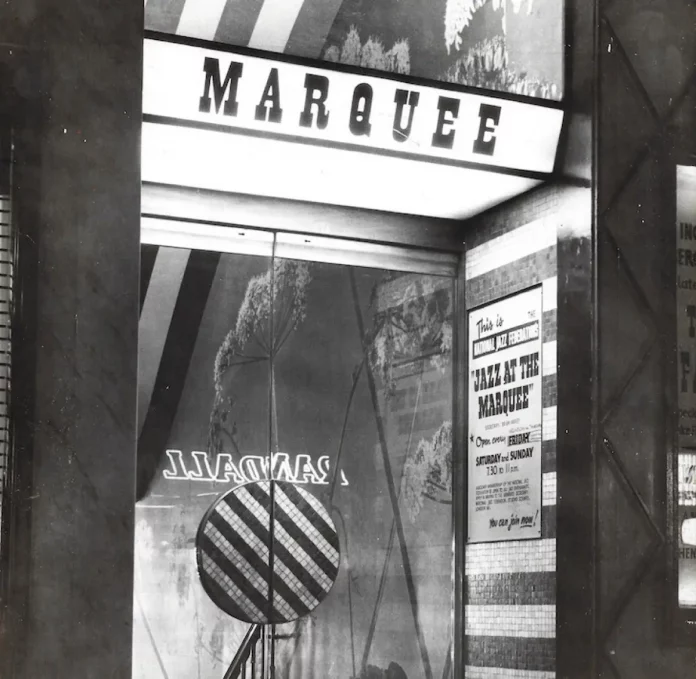The Marquee club next door to the Academy Cinema in Oxford Street, W., has featured a good many distinguished American – and British – jazz musicians in its seven years of existence. Fittingly, on the closing night we heard perhaps the greatest musician yet to be presented at a jazz club in London – Stan Getz. Magnificent though many of his records are, the quality of his playing in person far transcends any of them. He gave us about 75 minutes of sublimely beautiful music, which I for one will remember for a very long time.
Getz has always been one of the supreme melodists of jazz. His ballads, in particular, were superb examples of this aspect of the jazz art. Caressing, gentle, but with an inner strength that prevented them from ever becoming the least bit insipid or sentimental. At his favourite loping medium tempo, his wonderfully relaxed improvisations flowed beautifully, one idea leading naturally in to the next. As if to show he could swing as hard as anyone, he did a supercharged version of All God’s Children Got Rhythm that was almost frightening in its intense drive. The tunes he played were well varied and unusual, although much of his material was as unfamiliar to me as it was to his accompanists – Stan Tracey, piano; Malcolm Cecil, bass; and Jackie Dougan, drums. I did recognise We’ll Be Together Again among the ballads, All God’s Children and his final number (his second encore) Exactly Like You.
Getz no longer feels compelled to play Desafinado on every set, though he did do one bossa nova. And he played ‘stop-time’ choruses on one number with characteristic aplomb. Whatever doubts one might have had about the suitability of the Stan Tracey Trio as accompanists for Getz were quickly dispelled. They played quite impeccably. Tracey was more subdued than usual and Jackie Dougan coped excellently with a difficult task. Malcolm Cecil’s playing obviously delighted Getz as much as it did the audience. Above all, though, it was Getz who was in complete command. He knew how and when to build up tension and when to relax. When he played, it was as if his horn was an extension of his body, so complete was their unity.
Until our own musicians can achieve this relaxation and unity, when playing comes as naturally as breathing, this country will never produce a truly great jazz musician
Until our own musicians can achieve this relaxation and unity, when playing comes as naturally as breathing, this country will never produce a truly great jazz musician. In the meantime, we can enjoy the talents of tenorists like Ronnie Scott and Tubby Hayes, who also appeared at the Marquee on the bill with Getz.
Scott was in very good form during a short set with the Stan Tracey Trio which opened the evening. They did a swinging version of Just Friends, a rather limp What’s New? and a driving blues, I’m Sick And Tired Of Waking Up Tired And Sick, with a key change at the end of every second chorus. Scott thanked those in the audience who had voted him into second place in the tenor section of a recent poll, as he had backed himself to the tune of £5 each way at the liberal odds of 33-1, which gave him a handsome profit.
Tubby Hayes’ Quintet – Hayes, tenor and flute; Jimmy Deuchar, trumpet; Terry Shannon, piano; Rick Laird, bass; and Allan Ganley, drums, gave its usual polished performance. They played a modal blues, called, oddly enough, Modes In Blues, an unhackneyed standard, With The Wind And The Rain In Her Hair, and a ridiculously fast Clark Terry tune, Opus Ocean. The group seemed less involved with its music than usual, though they did well on a long blues waltz, the name of which may have been Flute Blues. This tune took up the whole of their second set, between the performances of Betty Bennett and Stan Getz.
Miss Bennett is a stylish American singer obviously more at home in the smart supper club than the jazz club. Her material was refreshingly unhackneyed for the most part. She did I Love Songs To Sing (perhaps she should have added, ‘even though I don’t always sing in tune’); a swinging Falling In Love With Love; a tender Every Time; an amusing It Could Be Worse; a rocking I Wish I Were In Love Again; a highly evocative Lazy Afternoon; and closed with Love Me. She sang well, without histrionics, and was well received by the audience. The Stan Tracey trio accompanied superbly.
A memorable way for the Marquee Jazz Club to end its tenure of the old premises. Let’s hope the new Marquee gives us as much good jazz. Somehow I think it will, at least while Stan Getz is around.
















